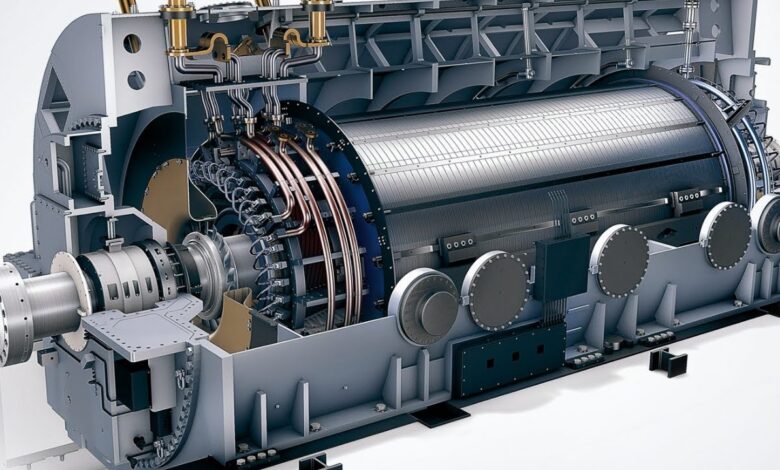Three-Phase Generators: Reliable Power for Heavy Usage

With worldwide reliance on power never higher, businesses and residential communities require effective and reliable power to operate. Where one-phase machinery is inadequate, a three-phase generator is the ideal answer. Three-phase generators are employed in industrial, rural, and commercial applications in the UK due to their ability to provide continuous, high-voltage power with improved efficiency.
This guide will explain what a three-phase generator is, how it works, the benefit of a three-phase generator, and how to choose the most suitable one for your use.
What Is a Three-Phase Generator?
A three-phase generator is a generator that produces electricity in the form of three alternating currents (AC), phased 120 degrees apart from each other. The system provides a steady supply of power to flow, since one phase is always at its peak at any point in time, thus much more efficient than single-phase systems that use a single wave.
Three-phase generators are used in:
- Manufacturing factories
- Upgrade and construction facilities
- Large office buildings
- Agricultural farms and processing plants
- Data centers and hospitals
How it works?
Three-phase generators generate electricity by rotating a magnetic field through three separate coils (or windings) in the alternator. The coils generate three separate sine waves that are out of phase with each other. This is a smoother, more balanced supply of electricity, which eliminates waves and allows carrying heavier loads without power upswings or downswings.
In a typical UK installation, a three-phase generator will supply:
- 400 volts between phases
- 230 volts between any one phase and neutral
- 50 Hz frequency, typical in the UK
This makes them suitable for three-phase apparatus and normal UK mains supplies.
Advantages of Three-Phase Generators
1. Higher Power Output
Three-phase systems can be more powerful without requiring additional wiring or generator, and therefore are well suited to heavy-use applications such as industrial production, air conditioners, or restaurant kitchens.
2. Energy Efficiency
Three-phase electricity conveys power more efficiently, with less energy loss and allowing equipment and motors to work with reduced friction.
3. Lighter Equipment
Since power is shared more evenly, the equipment weighs less and is smaller in size but equal output as a single-phase alternative which is larger in size.
4. Less Downtime
Since power is distributed evenly, the equipment is stressed less, and hence electrical faults or breakdowns are fewer.
5. Long-Term Cost Advantage
Although a three-phase generator has a higher initial capital investment, its lower operating and maintenance expenses have a tendency to render it cost-effective in the long term.
Uses in the UK
Organizations and institutions in the UK utilize three-phase generators as main supply and standby power, especially in:
- Construction: Sourcing power to heavy equipment, lighting, and site offices
- Healthcare: Sourcing power for uninterrupted use of vital systems
- Agriculture: Power equipment, pumps for irrigation, and cold storage
- Manufacturing: Powered by powering motor-driven production lines and heavy engines
- Events: Powered by powering lighting, sound, and catering in large quantities
Choosing the Proper Three-Phase Generator
In buying a generator, the following should be considered:
- Power demand: Determine total wattage of all equipment to be driven. Always purchase at least 20% higher capacity than your peak load.
- Fuel: Diesel is the most normal for three-phase generators because it’s efficient and long-lasting.
- Voltage & frequency: Have the generator provide 400V/230V at 50Hz, the normal three-phase UK grid.
- Portability or static use: Portable are appropriate for events and building work, while fixed are appropriate for fixed installations.
- Noise level: Silent or soundproofed units should be selected where utilized in residential or noise-restricted settings.
- Compliance: Select UKCA marked versions and British Standard (BS EN 60034) conformity in relation to performance and safety.
Maintenance and Safety
Similar to any other generator, three-phase units need to be serviced routinely for it to be safe to use:
Verify oil and coolant levels periodically
- Verify wiring and connectors for wear or damage
- Regularly run the generator to maintain it in running condition
- Have the machine serviced annually by a competent tradesperson
- Exercise caution always, from grounding equipment properly to avoiding overloading.
A three-phase generator is an efficient, effective, and reliable energy source solution for the heavy-duty use in the UK. From operating a large commercial enterprise or requiring to have safe backup for an office complex, a well-chosen and properly maintained three-phase generator ensures that your operation never leaves short on power in any situation. Click here for more information on Three-phase generators.




